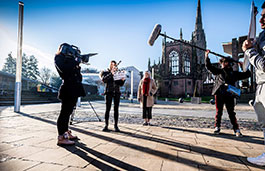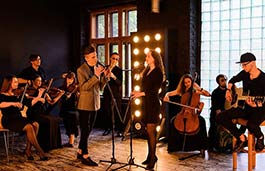Search
Music and Audio Production BSc (Hons)
Study level: Undergraduate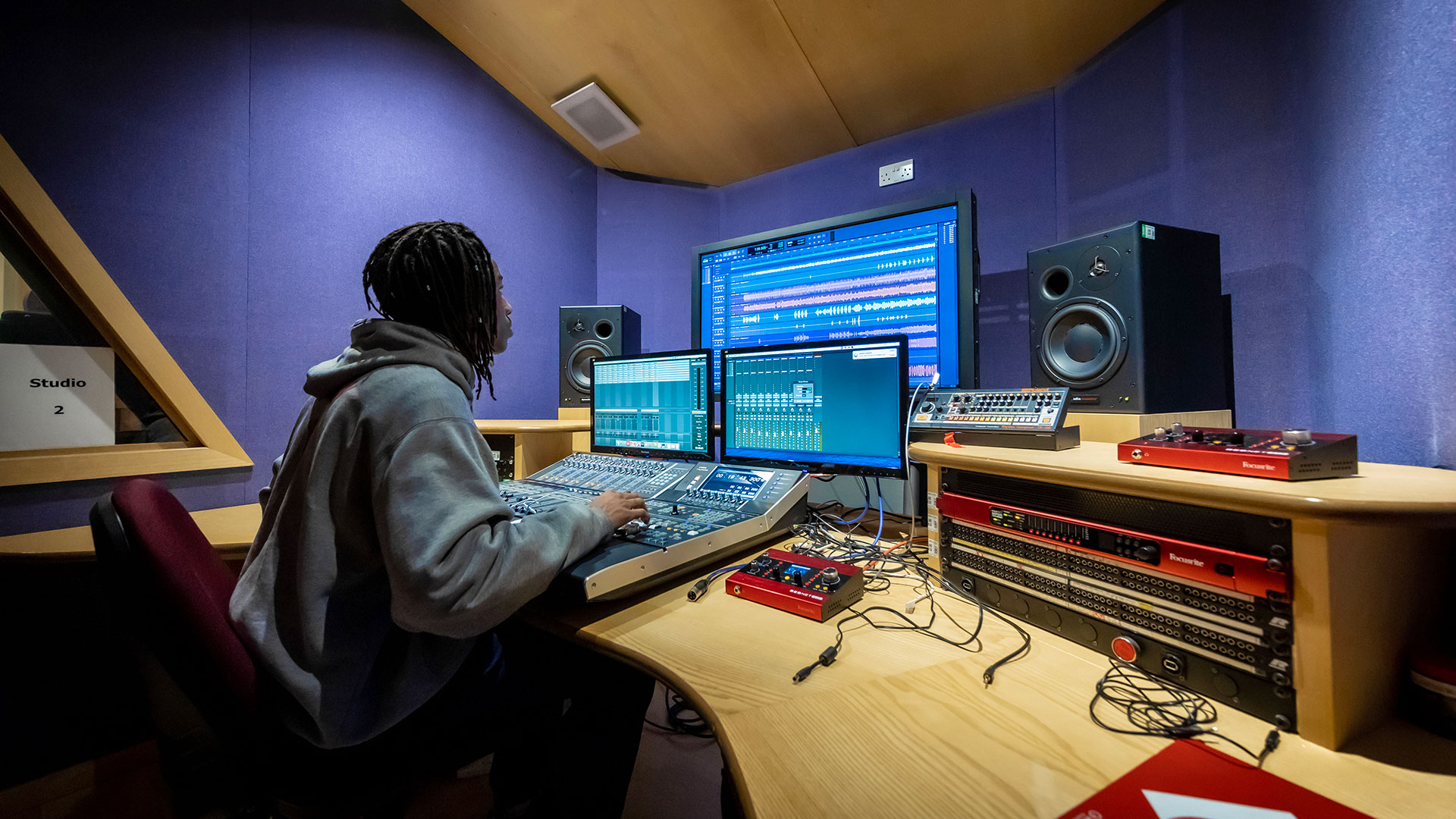
Passionate about creating and producing music? Develop the skills to record, compose, produce, mix and master your own tracks, supported by our expert tutors and industry-standard equipment.
Course features
Year of entry
2026-27
Location
Coventry University (Coventry)
Study mode
Full-time
Sandwich
Duration
3 years full-time
4 years sandwich
Course code
W374
Start date
September 2026
November 2026
January 2027
March 2027
May 2027
July 2027
Course overview
Are you an aspiring producer, sound designer or audio engineer? Explore the creative and technical world of music and audio production, develop studio skills, use industry-standard technology and build experience relevant to a range of roles in sound.
- Learn about recording, arranging and producing music using modern studio equipment and software.4
- Explore live sound, synthesis and interactive audio design for media, film and games.
- Gain industry insight through modules on music business, marketing and entrepreneurship.
Rated Gold Overall
Teaching Excellence Framework (TEF) 20235 QS Stars for Teaching and Facilities
QS Stars University RatingsTop 5 Student City in England (Coventry)
QS Best Student Cities Index 2026Why you should study this course
- Get practical experience with professional-grade equipment, including SSL, Audient and Neve mixing consoles, to build real-world technical expertise.4
- Collaborate on industry-informed projects to create a standout portfolio for a career in film, TV, radio or interactive media.
- Gain vital insight into music marketing, entrepreneurship and the business of audio to support freelance and employed pathways.
- Develop the skills and versatility to pursue careers such as music producer, composer, audio post-production technician or sound designer.
About the School of Arts and Creative Industries
- Our learning and teaching mirror the needs of the creative industries, so our graduates have the skills and attributes needed to become industry specialists, leaders and innovators.
- Our studio culture seeks to ensure you are socially responsible in our creative community and develop critical thinking in research and making processes.
- Our global initiatives aim to give you skills to become a collaborative communicator and make you culturally competent.
- Our strong industry links typically enable us to host an exciting programme of guest speakers covering topics such as sound design, immersive audio technologies and music production for media.2
- Past students have worked on projects as diverse as designing innovative sound experiences for Jaguar Land Rover, contributing to game audio projects with Mojang Studios (creators of Minecraft and Caller's Bane) and collaborating with the BBC on major movies and TV shows. They have also gained valuable experience working at major live festivals.
Graduate Showcase 2025
Check out what our School of Arts and Creative Industries students produced for their final projects to showcase at Coventry University's Graduate Festival.
Attended by hundreds of industry professionals, family and friends, across multiple weeks, our students' work was showcased at our very own Phoenix Film Festival, live performances from our theatre and music students and an on-campus exhibition.
What you'll study
This course has a common first year.
The common first year enables you to work alongside students doing similar courses to you, to widen your knowledge and exposure to other subject areas and professions. You will have the opportunity to collaborate with other students, so you can share your insights and experience which will help you to develop and learn.
If you discover an interest in a specific subject you have studied, upon successful completion of your first year, and subject to meeting progression requirements, you could swap degrees with another course in your common first year.
Common first year courses
- Music and Audio Production BSc (Hons)
- Popular Music Performance and Songwriting BA (Hons)
We regularly review our course content, to make it relevant and current for the benefit of our students. For these reasons, course modules may be updated.
How you'll learn
Teaching and learning methods may include:
- lectures
- seminars
- tutorials
- presentations
- group projects
- workshops
- practical studio sessions
- practical workshop sessions.
Teaching contact hours
As a full-time undergraduate student, you will study modules totalling 120 credits each academic year. You will normally study one 30-credit module at a time. A typical 30-credit module requires a total of 300 hours of study made up of teaching contact hours, guided and independent study.
Teaching hours
Teaching hours may vary depending on your year of study and selected modules. During your first year, you can expect 12-15 teaching hours each week. You will also have the option to attend additional sessions, including time with a progress coach or to meet with staff for advice and feedback. As you progress through your studies, teaching hours may reduce.
Guided and independent study
Throughout your studies, you will be expected to spend time in guided and independent study to make up the required study hours per module. You’ll be digging deeper into topics, review what you’ve learned and complete assignments. This can be completed around your personal commitments. As you progress through your studies, you’ll spend more time in independent study.
Online learning
As an innovative university, we use different teaching methods including online tools and emerging technologies. So, some of your teaching hours and assessments may be delivered online.
Assessment
This course is assessed using methods that vary by module. These approaches are intended to prepare you for the complex and evolving contexts of professional practice.
Assessment methods may include:
- artefacts
- practical coursework
- digital coursework
- individual work
- group work
- live presentations
- presentations/poster presentations
- individual assignments.
The Coventry University Group assessment strategy ensures that our courses are fairly assessed and allows us to monitor student progression towards the achieving the intended learning outcomes.
Entry requirements
Typical entry requirements:
Fees and funding
| Student | Full-time | Part-time |
|---|---|---|
| UK, Ireland*, Channel Islands or Isle of Man | 2026/27 fees TBC 2025/26 fees: £9,535 per year |
Not available |
| EU | 2026/27 fees TBC 2025/26 fees: £9,535 per year with EU Support Bursary** 2026/27 fees TBC 2025/26 fees: £19,850 per year without EU Support Bursary** |
Not available |
| International | 2026/27 fees TBC 2025/26 fees: £19,850 per year |
Not available |
If you choose to study this course with a professional placement2 or study abroad year, you will need to pay a tuition fee3 to cover your academic support throughout your placement year. Students commencing their professional placement in the academic year 2027/28 will pay £1,500 if they are paying UK fees, or £1,800 if they are paying international fees.
For advice and guidance on tuition fees and student loans visit our Undergraduate Finance page and see The University’s Tuition Fee and Refund Terms and Conditions.
The University will charge the tuition fees that are stated in the above table for the first Academic Year of study. The University will review tuition fees each year. For UK (home) students, if Parliament permits an increase in tuition fees, the university may increase fees for each subsequent year of study in line with any such changes. Note that any increase is expected to be in line with inflation.
If you choose to study this course with a professional placement, the University will charge the tuition fees stated above for those on a placement during Academic Year 2027/28. The University will review professional placement tuition fees each year. For UK (home) students, the University may increase fees for each subsequent year of study, but such that it will be no more than 5% above inflation.
For international students, we may increase fees each year, but such increases will be no more than 5% above inflation. If you defer your course start date or have to extend your studies beyond the normal duration of the course (e.g. to repeat a year or resit examinations) the University reserves the right to charge you fees at a higher rate and/or in accordance with any legislative changes during the additional period of study.
We offer a range of International scholarships to students all over the world. For more information, visit our International Scholarships page.
Tuition fees cover the cost of your teaching, assessments, facilities and support services. There may be additional costs not covered by this fee such as accommodation and living costs, recommended reading books, stationery, printing and re-assessments should you need them. Find out what's included in your tuition costs.
The following are additional costs not included in the tuition fees:
- Any optional overseas field trips or visits: £400+ per trip.
- Any costs associated with securing, attending or completing a placement (whether in the UK or abroad).
*Irish student fees
The rights of Irish residents to study in the UK are preserved under the Common Travel Area arrangement. If you are an Irish student and meet the residency criteria, you can study in England, pay the same level of tuition fees as English students and utilise the Tuition Fee Loan.
**EU Support Bursary
Following the UK's exit from the European Union, we are offering financial support to all eligible EU students who wish to study an undergraduate or a postgraduate degree with us full-time. This bursary will be used to offset the cost of your tuition fees to bring them in line with that of UK students. Students studying a degree with a foundation year with us are not eligible for the bursary.
Facilities
At Coventry, students benefit from superb facilities4 so they can build on their practical talent. Facilities include:
- Several recording studios (including SSL and Neve mixing desks)
- Various live rooms and performance spaces
- An iMac music tech suite plus further state-of-the-art recording studios running Pro Tools, Logic, Live, Max and Sibelius on Apple macs.
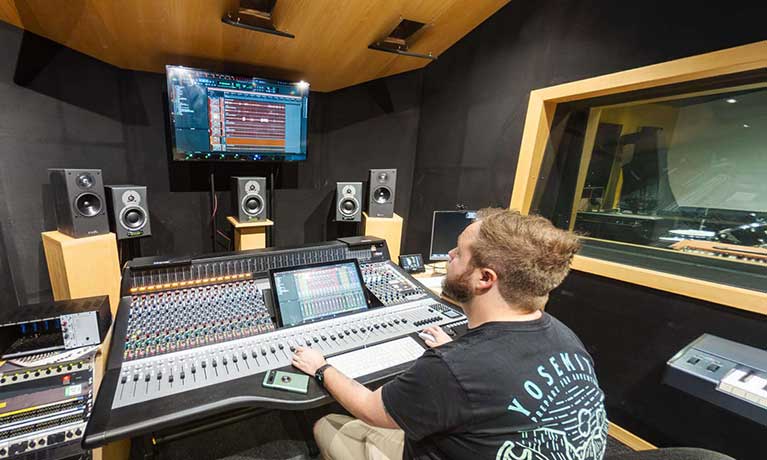
Recording studios
We have five superb recording studios, instrument storage, and an iMac music tech suite. We also have modern recording studios running Pro Tools, Logic, Live, Max and Sibelius on Apple macs.
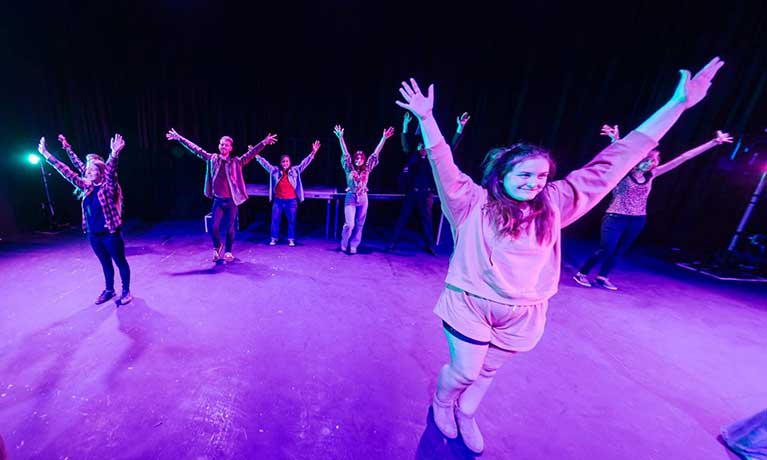
Performance spaces
Our Ellen Terry Building has a dance performance space, two dance studios and a theatre workshop. It also has dressing rooms and storage with around 3,500 costume items and 1,500 accessories.
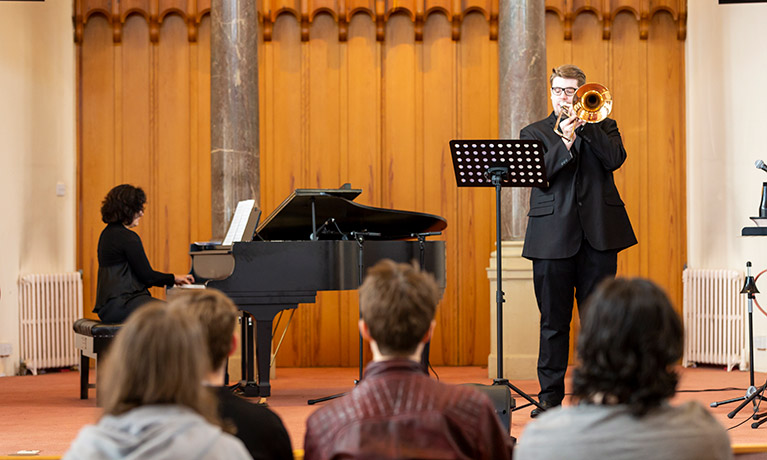
Music seminar room
A great space for our budding musicians, our specialist music seminar room comes with a grand piano, PA, amplifiers, a drum kit and 5.1 surround sound system, all directly linked to a control room for recording.
Facilities are subject to availability. Access to some facilities (including some teaching and learning spaces) may vary from those advertised and/or may have reduced availability or restrictions where the university is following public authority guidance, decisions or orders.
Careers and opportunities
On successful completion, you should have knowledge of:
- Concepts of professionalism within music technology (including composition, recording techniques and technology, Live sound, music production) and related disciplines and their relationship to music technology within a global context.
- The skills, processes and techniques required for the creation, realisation, presentation and management of work as a music technologist, working within the digital age.
You should be equipped with the skills to:
- Demonstrate technical skills relating to a range of recording, mastering, Music production, live sound and music composition.
- Apply technological and music related skills creatively to a brief to a high standard of aptitude, demonstrating the appropriate breadth and depth of conceptual development.
- Apply creative solutions to a brief, using technical means and appropriate application of materials, processes and technologies to develop a coherent body of work that reflects the particular characteristics of your own creative perspective.
There is a strong emphasis within the course on your future career, not only helping you to discover your potential chosen career path but also aiming to ensure that you have the professional level of business skill and knowledge to thrive in this demanding industry.
Where our graduates work
Previous examples of employment include music producers, sound engineers, composers; audio post- production technicians together with work in extensive related fields such as radio and television sound.
The graduate destinations listed above illustrate potential career paths. You may need to gain additional qualifications or practical experience, pass professional examinations, complete training, cover associated costs and meet specific visa or immigration requirements to secure employment in these fields.
Further study
You can choose to continue your studies at Coventry University with:
You may be entitled to an alumni discount on your fees if you decide to extend your time with us by progressing from undergraduate to postgraduate study.

Discover Phoenix+
Phoenix+ brings you together with other students to learn, experience and develop essential knowledge and skills. Whatever destination you choose, it's about preparing you for life after university.
Learn more about Phoenix+How to apply
You may also like

Popular Music Performance and Songwriting BA (Hons)
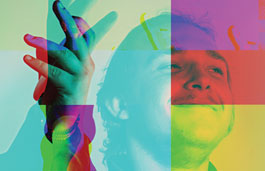
Digital Media BA (Hons)
